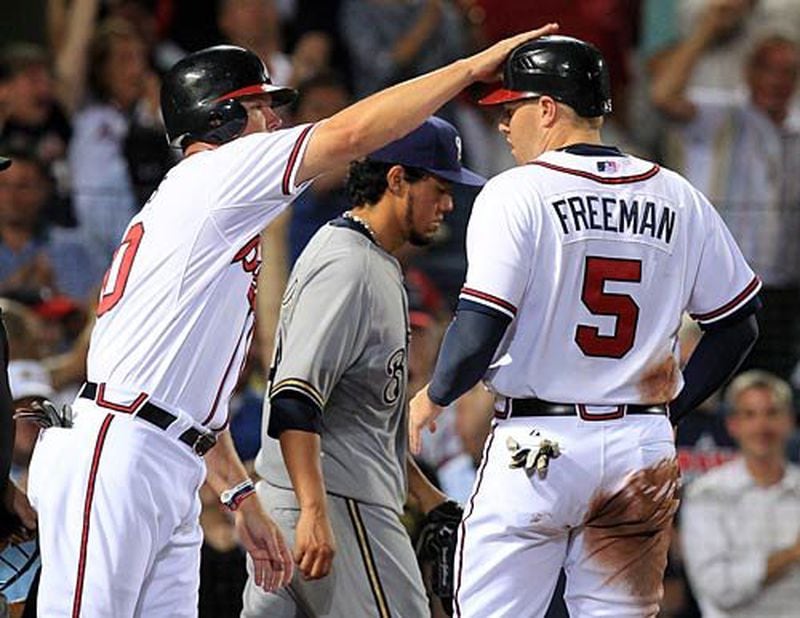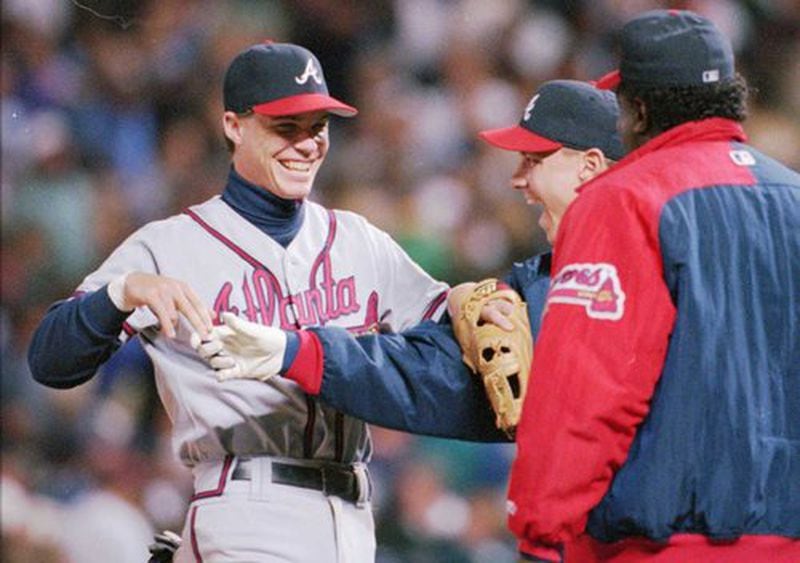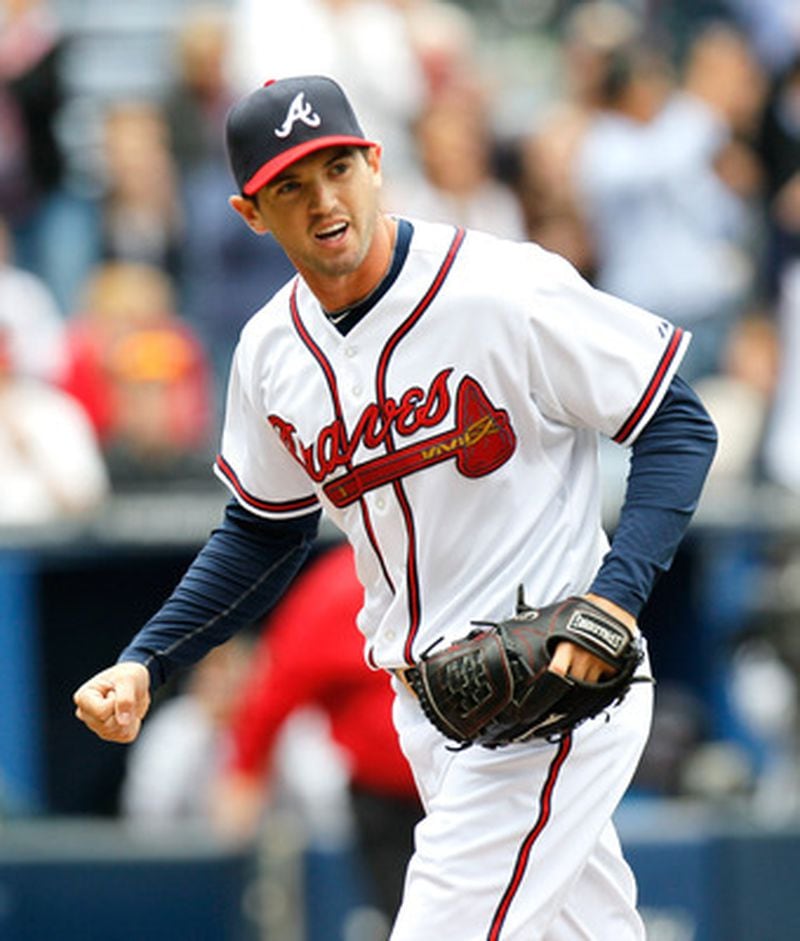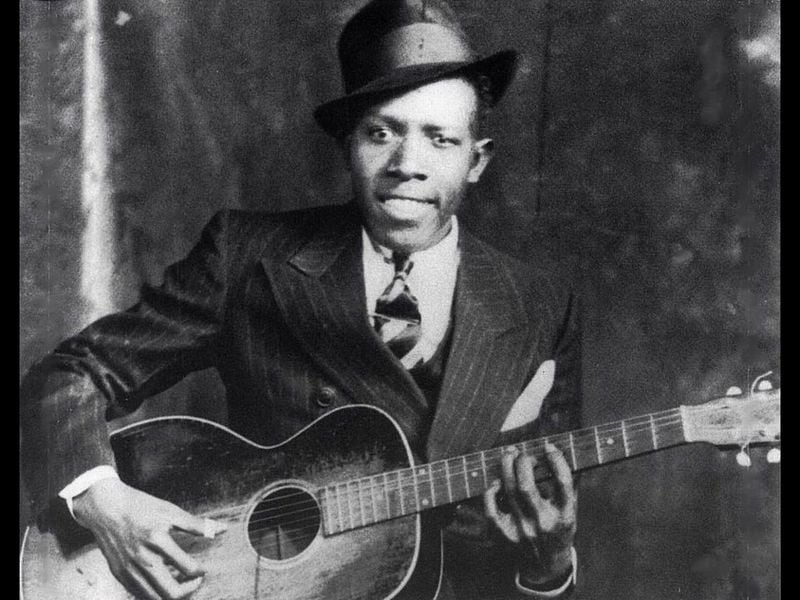DARK STAR, Fla. – The deteriorating weather in Atlanta forced us to head south to spring training a couple of days earlier than expected, and I know you folks are really feeling sorry for me about now, right? Nearly 80 degrees here when I arrived.
In all seriousness, stay safe up there in the South and don’t get behind the wheel for the next day or two unless you absolutely can't avoid it.
Hopefully the power-outage situation won’t materialize to the degree that they’re fearing it will. Good luck, and hopefully this will be the last nasty blast of the worst winter weather around Atlanta and the region. What a winter, huh? Thank goodness baseball is just about here.
We’ll try to make things a little less boring or brutal if you’re stuck inside for the next couple of days, with baseball talk and a few photos from earlier arrivers after I get out to the ballpark on Wednesday. Remember, pitchers and catchers officially report Thursday and the first workout is Friday, and position players report Feb. 18, with the first full-squad workout on Feb. 19.
However, several position players and pitchers have already begun working out at the Lake Buena Vista training camp, including newly minted $135 million man Freddie Freeman and heir apparent primary catcher Evan Gattis.
Before we go any further, I wanted to share with you a couple of stats I found last week when I was doing stories on Freeman and his ginormous, franchise-record eight-year contract, which easily eclipsed the six-year, $90 million extension that Chipper Jones got for the 2001-2006 seasons as the largest deal in Braves history.
At the time, Chipper’s $90 million deal was the fourth-largest in baseball history.
And speaking of Chipper, he’s part of the stats I’m talking about. Specifically, I was curious as to how Freeman’s first three full seasons compared to the retired Hoss’ first three full seasons in the big leagues. So here we go:
Chipper had exactly 500 hits (in 1,874 PAs) in his first three full seasons (ages 23-25 seasons), with 95 doubles, 74 homers and 307 RBIs in 454 games.
Freeman had 477 hits (in 1,884 PAs) in his first three full seasons (ages 21-23 seasons), with 92 doubles, 67 homers and 279 RBIs in 451 games.
Note: Neither of those stat lines includes brief callups for both players in one previous season before the three full seasons.
The most glaring difference in their stats from the first three seasons was whiffs and walks: Chipper had 275 strikeouts and 236 walks, while Freeman had 392 strikeouts and 183 walks. Also, Chipper obviously ran a lot better than Freeman, even though Chipper had blown out his ACL in spring training of his would-be rookie year and missed a whole season rehabbing. And, yes, Chipper had more raw power.
(Hey, Chipper had better overall stats. The dude's going to Cooperstown on the first ballot, after all. Mark that down, anyone who questions that. But Chipper also had a much stronger supporting cast. As Chipper told me a couple of springs ago, Freeman and Jason Heyward don't have the luxury he did of being surrounding by so many established veterans in his early years and being able to get acclimated and grow up without having to be the spokesman for the team or expected to carry so much of the offensive load at the outset of his career.)
Where were we? Oh, yeah: Chipper’s eight stolen bases as a rookie were one more than Freeman has in his entire career so far. And Chipper raised it to 14 steals in his second year and 20 in his third. However, Freeman’s doubles totals still compared favorably in doubles, because he hits so many line drives that good speed isn’t necessary for him to rumble to second base most of the time.
Each was the NL Rookie of the Year runner-up behind a pitcher -- Chipper finished second to former Japanese League star Hideo Nomo and Freeman was second behind teammate Craig Kimbrel.
Chipper made the All-Star team twice in his first three seasons and finished 18th, fourth and ninth in the MVP balloting in those years. Freeman has made one All-Star team and was fifth in the MVP balloting, both in his third season in 2013.
Some pretty interesting similarities, no? Well, at least I thought so.
Oh, one more thing: The most that Chipper earned in salary in any five-year period was just a tick below $70 million during the 2003-2008 seasons, when the future Hall of Famer topped out at $16.06 million, including a prorated share of his signing bonus.
Freeman, in the last five years of his contract, will make $106.5 million in salary alone (not counting any portion of of signing bonus). His straight salary is above $20 million each of those seasons, rising rising from $20.5 million in 2017, the Braves’ first year in their planned new Cobb County ballpark, to $21 million in 2018-2019, and $22 million in 2020-2021.
• Option-less: Rare is the spring training that goes by without talk of this player or that being out of minor-league options, since one or more position battles is usually affected by the situation. A 40-man roster player who is out of minor league options can't be sent to the minors without first clearing waivers, meaning every other team would have to pass on him.
Four Braves 40-man roster players are out of options: relievers David Carpenter, Cory Gearrin and Anthony Varvaro; utility man Ramiro Pena, and outfielder Jordan Schafer.
I would guess than at least four and probably all of them wouldn’t make it through waivers without being claimed by another team if the Braves tried to send one or more of them down. But entering spring training, I’d also expect all five of them to make the Opening Day roster. The only one I could possibly see being exposed to waivers would be Varvaro, and if he looks healty and capable of pitching like he did for much of last season, I wouldn’t expect him to be put on waivers.
By the way, the Braves acquired three of those five via waive claims: Carpenter, Varvaro, and Schafer.
• The Braves' streaks of '14: Many if not most of you are well aware that the Braves built their 96-66 record last year in big part due to two tremendous stretches of baseball, one at the start of the season and one at mid-summer. After all, it's an informed lot that reads the Man in Black blog, am I right. (Heads nod to concur.)
But some of you might not realize just to what extent that was the case. Think about this: The Braves went 12-1 with a 1.83 ERA and 25 home runs to open the season, and went 14-0 with a 2.08 ERA, .293 batting average and 82 runs from July 26 through Aug. 9.
That’s 26-1 with a 1.96 ERA in those 27 games.
In the period between those two streaks, they went 45-44 with a 3.62 ERA and .247 batting average in 89 games. And in the last 50 games of the season and the division series, they were a combined 26-24 with a solid 3.28 ERA but only a .233 batting average.
Outside of their 13-game and 14-game tears, the Braves were a combined 71-68, including the four-game loss to the Dodgers in the division series.
To be fair, most good teams have a few good runs and plenty of mediocre stretches during a typical season. It’s just that the Braves’ surges were a bit extreme, and their offense alarmingly inconsistent, going from being an unstoppable force when they had a handful of hitters going strong during a few stretches, to being entirely underwhelming for extended periods.
For all the talk of them not getting a “true No. 1” starter during the offseason, what the Braves need to be more concerned about is getting better consistency from their lineup in 2014. The pitching is plenty good enough to go deep into the postseason.
• C. Johnson still hungry: You probably saw a couple of stories we've written this month about Chris Johnson and how he's been working out daily at Turner Field and basically trying to do all the things he did last winter before his career-best season. That includes living in Atlanta in a rented house only about 15 minutes from the ballpark, rather than return to the warmth of his native Florida.
Well, anyway, some believe that Johnson’s season will be tough to replicate, citing some advanced metric stats including an unusually high batting average on balls in play. Johnson isn’t among those people, as you might imagine. He and his teammates, who were impressed with him from the beginning of spring training last year, believe he is as good a hitter as the basic numbers say he was last year -- .321 average, 34 doubles, 12 homers, .358 OBP.
Already a pretty big dude, he’s added some more noticeable muscle in the upper body. I asked him about that last week at Turner Field.
“Little bigger, little less body fat, little quicker,” he said. “So we’ll see. I’ve been working on quickness, defensive stuff. TP (first-base coach Terry Pendleton) has been here a lot, we’ve been working on that. Lot of footwork, that first-step quickness, some hand stuff.”
There is one offensive number that jumps off the page and will undoubtedly be tough to match -- .383. His average against left-handers, which was far and away the best for any major league qualifier.
Johnson, a right-handed hitter who actually hit for a higher average against righties than lefties in the past, focused last spring training on facing lefties, because at the time he thought he’d be in a platoon with Juan Francisco all season.
But when Johnson excelled early and Francisco struggled and piled up too many whiffs between hits, the latter was dropped and Johnson got the full-time 3B job. He hit .383 with a .413 OBP and .526 slugging percentage in 133 at-bats vs. lefties, and .299 with a .339 OBP and .433 slugging in 381 at-bats vs. righties.
He also hit .336 in 119 at-bats with runners in scoring position, including .390 in those situations with two outs. If it weren’t for Freeman and Johnson, the Braves’ pretty bad team numbers with RISP would’ve been horrendous.
Here’s one more stat to consider, to be reminded of how good Johnson was for much of last season: From Opening Day through Aug. 2, he hit .347 (115-for-331) with a .385 OBP and .483 slugging percentage, and the Braves were 58-35 in the games he played in that period.
Johnson hit .273 (50-for-183) with a .309 OBP from Aug. 3 through the end of the regular season, and the Braves were 28-21 in those games.
• Heyward contract details: It got largely overshadowed by the mammoth deal that Freeman signed later the same day, but Jason Heyward's two-year, $13.3 million contract extension last week was the kind of thing that would've made big news any other day during the offseason.
Now it’ll be interesting to see if the Braves approach him again before the deal expires after the 2015 season and before Heyward becomes a free agent. My gut and everything else tells me that now that Heyward is this close to free agency and the Braves didn’t extend him beyond his arbitration years, he’ll wait and test the open market, where some have already predicted he’ll get at least $100 million and perhaps $150 million or more in a deal that rivals or even surpasses Freeman’s.
That remains to be seen, but we’ve obviously seen Heyward show the potential to be every big as big or bigger a run-producer than Freeman. It’s just that Heyward hasn’t done it nearly as frequently, in large part due to injuries, some serious and completely out of his control, others nagging sort of aches and pains, but all disruptive of his career trajectory.
A couple of details about Heyward’s two-year contract: It includes a $1 million signing bonus, payable in two equal installments May 1 and July 1, and salaries of $4.5 million in 2014 and $7.8 million in 2015. There are also potential salary escalators that can raise his pay in 2015, based on performance in 2014.
His 2015 salary can escalate on a points system -- $500,000 increase for 20 points and then another $25,000 for each additional point. He can get 10 points each for 502 plate appearances, an All-Star game selection, a Gold Glove, a Silver Slugger and finishing from 11th to 20th in MVP voting. He would earn 15 points for finishing 6th to 10th in the MVP balloting, 25 points for third to fifth, and 35 points for first or second.
Word spread that day at Turner Field among the pitchers and catchers and others who were on hand. (This was before the Freeman contract news became the day’s big story.)
“I think it’s awesome” that Heyward was signed for two years, said Braves pitcher Mike Minor. “He’s a big part of the team, big part of the organization. I think it’s really smart of those guys to lock him up. I know they tried before but now I guess they agreed to something. It’s a big day. Two more years of having the guy on the team for sure and him being comfortable and not having to worry about (a contract).”
And this from Brandon Beachy on Heyward's signing, “That’s great news. It’s good for everybody.”
• Here's one by the one and only Robert Johnson, which you can hear by clicking here.
“HELLHOUND ON MY TRAIL” by Robert Johnson
I got to keep moving, I got to keep moving
Blues falling down like hail, blues falling down like hail
Mmm, blues falling down like hail, blues falling down like hail
And the day keeps on remindin' me, there's a hellhound on my trail
Hellhound on my trail, hellhound on my trail
If today was Christmas eve, if today was Christmas eve
And tomorrow was Christmas day
If today was Christmas eve and tomorrow was Christmas day
All I would need is my little sweet rider
Just to pass the time away, to pass the time away
You sprinkled hot foot powder, mmm, around my door
All around my door
You sprinkled hot foot powder, all around your daddy's door
It keeps me with ramblin' mind rider
Every old place I go, every old place I go
I can tell the wind is risin', the leaves tremblin' on the tree
Tremblin' on the tree
I can tell the wind is risin', leaves tremblin' on the tree
All I need is my little sweet woman
And to keep my company, hey, hey, hey, hey, my company
About the Author









